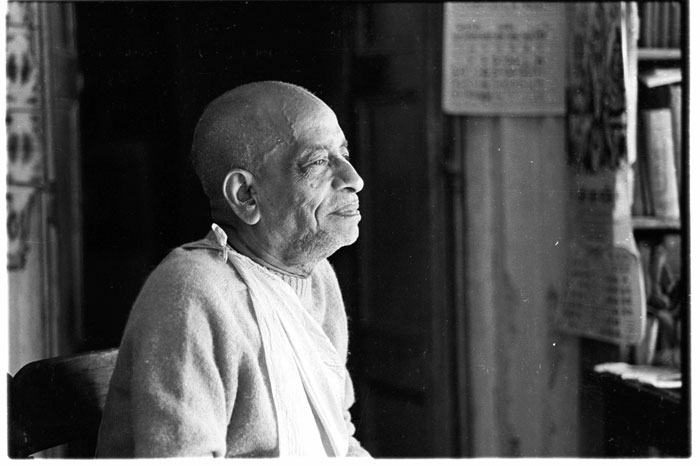
16 Aug To Srila Prabhupada on His Appearance Day (2017)
nama oṁ viṣṇu-pādāya kṛṣṇa-preṣṭhāya bhū-tale
śrīmate bhaktivedānta-svāmin iti nāmine
namas te sārasvate deve gaura-vāṇī-pracāriṇe
nirviśeṣa-śūnyavādi-pāścātya-deśa-tāriṇe
mūkaṁ karoti vācālaṁ paṅguṁ laṅghayate girim
yat-kṛpā tam ahaṁ vande śrī-guruṁ dīna-tāraṇam
“A book is a mirror,” observed Georg Christoph Lichtenberg, the eminent eighteenth-century German scientist and aphorist. “If a monkey peers into it, an apostle can hardly be expected to look out.”
This aphorism tends to spring to mind whenever I pick up one of Śrīla Prabhupāda’s books and open its pages to read. For these books are the exception that proves—i.e., tests—Lichtenberg’s rule. I am not alone in discovering that the books of Śrīla Prabhupāda possess a singular and quite astounding power: they can transfigure monkeys into apostles.
The books themselves convey clear and explicit directions for their own readings. In his purports Śrīla Prabhupāda repeatedly calls our attention to those directions, in the way that he does, for instance, at the outset of his introduction to Bhagavad-gītā As It Is:
The spirit of Bhagavad-gītā is mentioned in the Bhagavad-gītā itself. It is just like this: If we want to take a particular medicine, then we have to follow the directions written on the label. We cannot take the medicine according to our own whim or the direction of a friend. It must be taken according to the directions on the label or the directions given by a physician.
The guidance for reading or hearing Śrīla Prabhupāda’s books is presented and re-presented in a simple, clear, and convincing manner. These often appear in reference to exemplary occasions of effective transmission that are recorded in Śrīmad Bhāgavatam itself. Consider, for instance, this purport to SB 1.3.44:
Simple hearing is not all; one must realize the text with proper attention. The word niviṣṭa means that Sūta Gosvāmī drank the juice of Bhāgavatam through his ears. That is the real process of receiving Bhāgavatam. One should hear with rapt attention from the real person, and then he can at once realize the presence of Lord Kṛṣṇa in every page. The secret of knowing Bhāgavatam is mentioned here. No one can give rapt attention who is not pure in mind. No one can be pure in mind who is not pure in action. No one can be pure in action who is not pure in eating, sleeping, fearing and mating. But somehow or other if someone hears with rapt attention from the right person, at the very beginning one can assuredly see Lord Śrī Kṛṣṇa in person in the pages of Bhāgavatam.
Śrīla Prabhupāda refers to bhakti-yoga as a science—as in expressions like “the science of Kṛṣṇa consciousness” or “ the science of self-realization.” The original Sanskrit word that he translates, felicitously, as “science” is vijñāna, formed by prefixing the word for knowledge, jñāna, with vi-, which functions as a kind of all-purpose intensifier. The word vijñāna denotes knowledge that is directly apprehended or experienced; Śrīla Prabhupāda often refers to vijñāna as “realized knowledge” and, appropriately, as “scientific knowledge.” Of course, ours is not “material science.” Yet as a proper science, the science of Kṛṣṇa consciousness is verifiable by anyone who is willing and able to adhere scrupulously to its proper procedures.
A necessary feature of such procedures is the clarification, intensification, and concentration of consciousness: the required “rapt attention.” This itself requires a pure mind, which requires pure action, which requires purity even in the most basic, animal activities of life: “eating, sleep, fearing [i.e., defending], and mating.”
Herein lies the required commitment to follow strictly “the four regulative principles,” of no meat eating, no intoxication, no gambling, and no illicit sex.
Most of us are disposed automatically to regard these sorts of strictures as “moral principle,” and, as such, having to do mainly with consequences of rewards or punishments, of enjoying or suffering, of heavens or hells.
But here it becomes clear that these “regulative principles” are more far-reaching than that. They are, in fact, fundamental principles of cognition, of knowledge. For this reason, knowledge, properly so called, depends upon sattva—on goodness—and, for its further development, on a more refined and rarified goodness called viśuddha-sattva.
A materialistic critic might find fault with such a claim to “knowledge” by deriding it as “mysticism,” which is attractive only to “escapists” and is utterly worthless for shining any practical light on the gross and palpable world that surrounds, contains, and, indeed, composes us.
That might be true of the jñāna-yogi, but for the bhakti-yogi, the world, as it were, comes back, but now disclosed as it truly is: as it is in its relationship to Kṛṣṇa.
As Śrīla Prabhupāda states in the purport to SB 2.9.5: “By bhakti-yoga one can know the Lord, and by knowing the Lord as the Supreme, one is able to know everything else. That is the version of all Vedas.” When making this important point, Śrīla Prabhupāda frequently quotes a text from the Muṇḍaka Upaniṣad (1.3) that defines the Absolute Truth as that unique entity “knowing which, all else becomes known.” For instance, in this early lecture in Los Angeles (July 5, 1971):
So one who performs this yoga system, how to increase love for Kṛṣṇa, that’s all, then you understand everything. The Vedas, they confirm it: yasmin vijñāte sarvam evaṁ vijñātaṁ bhavanti. If you simply understand Kṛṣṇa, then everything will be understood. Because Kṛṣṇa is everything. God is everything.
Our philosophy is called sa-viśeṣa, that is, “with varieties.” Once some of us who were members of the newly formed Bhaktivedanta Institute were accompanying Śrīla Prabhupāda on a morning walk in New Vrindavan through the summer woods. Śrīla Prabhupāda pointed out that the arboreal wood around us is really fire in another form. The tree, he explained, takes in sunlight—fire—and it grows wood. If later you harvest some of the wood for heat and ignite the wood, the fire reappears. So wood is just fire in another form. Similarly, he said, matter is really spirit in another form.
What Prabhupāda said left me bewildered, and a little later I had the chance to put my problem before him. I told him I was confused. “Right now,” I explained, “I am very involved in trying to understand that ‘I am not this body,’ that I am spirit, but my body and mind are matter. So I am very engaged in discriminating between matter and spirit. But now, you are saying that everything is spirit. So I am confused.”
It took me some years to fully assimilate Śrīla Prabhupāda’s response of two short sentences. He said: “We are not māyāvādīs. There are different kinds of spirit.”
Māyāvāda philosophy is called nir-viśeṣa—that in there are no varieties (viśeṣas) in Brahman. Our philosophy is called sa-viśeṣa, “with varieties.” As Prabhupāda expressed it in the last purport of Bhagavad-Gītā As It Is: “Although superficially the Supreme Personality of Godhead, the living entity, material nature and time appear to be different, nothing is different from the Supreme. But the Supreme is always different from everything.” Earlier in the same purport he noted: “Perfect knowledge of the Absolute Truth means perfect knowledge of Kṛṣṇa. If one understands Kṛṣṇa, then all the departments of knowledge are part and parcel of that understanding.”
This, then, is the supreme and inclusive science, and we are to learn it, apply it in all areas, and most importantly, guide and direct a grievously misguided and misdirected human society.
In a New York City airport, a reporter began a press conference with this question to Śrīla Prabhupāda: “Why have you come to the West?” Prabhupāda at once replied: “I have come to give you a brain.”
This is our assignment, our mission. Śrīla Prabhupāda went on to explain how a society has a head, arms, belly and legs, but our modern society is headless. There are no brāhmaṇas. (A little later on Prabhupāda remarked “In your society everyone is a śūdra, and there are a few vaiśyas.”)
Our special mission is to become the brain, for which Śrīla Prabhupāda has given us all that we need. We have been gifted with potent knowledge of the book Bhāgavatam, the message of Kṛṣṇa. And Kṛṣṇa’s own messenger, the person Bhāgavata, Śrīla Prabhupāda, bore it across the waters aboard a vessel with the portentous name Jaladūta, “Water Messenger.”
The aphorism of Lichtenberg holds true. “If a monkey looks in, no apostle will look out.” The word “apostle” means messenger, and from Śrīla Prabhupāda we monkeys have been given all we require to become apostles ourselves: to assimilate the message of Godhead and to deliver that message to a world in critical need of it.
Begging for the blessings of the Vaiṣṇavas, on this auspicious day, to become the servant of Śrīla Prabhupāda and the servant of his servants,
Ravīndra Svarūpa dāsa



Anindita devi dasi
Posted at 02:27h, 17 AugustHare Krishna Gurudeva,
Please accept my respectful obeisances. All glories to Srila Prabhupada. All glories to you!
This is such a powerfully inspiring offering to Srila Prabhupada! It fills my heart with renewed enthusiasm to sincerely follow the regulative principles and read Srila Prabhupada’s books regularly with rapt attention. Thank you!
Mixkino
Posted at 10:59h, 14 AugustOn September 1, 1896, His Divine Grace A. C. Bhaktivedanta Swami Prabhupada made his appearance in this world in Calcutta, Bengal. Born on the day immediately after Krsna Janmastami, he was given the name Abhay Carana by his Vaisnava father, Gour Mohan De, and his mother Rajani. Gour Mohan’s principle desire for his son’s spiritual future was for him to become a pure devotee of Lord Sri Krsna, the ultimate goal of Vaisnavism.
Mixkino
Posted at 05:18h, 15 AugustIn 1922, Srila Prabhupada’s spiritual master, Srila Bhaktisiddhanta Sarasvati Gosvami, naturally recognized the true shaktavesa identity of his new disciple. He indicated that Abhaya Carana’s assigned mission was to be the vehicle by which the transcendental message of Lord Caitanya Mahaprabhu was to be taken to the western world. Today, Srila Prabhupada’s success is evident not only in the West, but in nearly every place on the planet where the maha mantra,